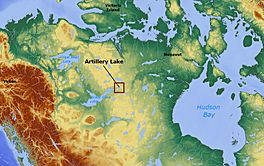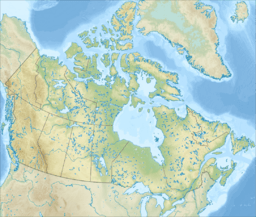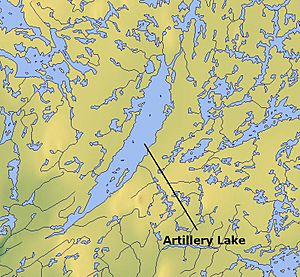Artillery Lake facts for kids
Quick facts for kids Artillery Lake |
|
|---|---|
 |
|
| Location | Northwest Territories |
| Coordinates | 63°10′N 107°52′W / 63.167°N 107.867°W |
| Type | Lockhart River |
| Primary inflows | Lockhart River |
| Basin countries | Canada |
| Surface area | 551 km2 (213 sq mi) |
| Surface elevation | 364 m (1,194 ft) |
Artillery Lake is a large lake located in the Northwest Territories of Canada. It is an important part of the Lockhart River system. The lake is found about 20 miles (32 kilometers) east of the much larger Great Slave Lake.
Contents
Discovering Artillery Lake
Artillery Lake has been known to local Indigenous peoples for a very long time. However, it was first explored by Europeans in the 19th century.
George Back's Journey
In 1834, a British naval officer and explorer named George Back reached Artillery Lake. He was on an expedition to explore the Arctic regions of North America. His journey helped map out many parts of the Canadian North.
Geography and Features
Artillery Lake is a significant body of water in a vast and wild part of Canada. It plays a key role in the region's natural water flow.
Size and Location
Artillery Lake covers an area of about 551 square kilometers (213 square miles). This makes it one of the larger lakes in the Northwest Territories. It sits at an elevation of 364 meters (1,194 feet) above sea level. The lake's remote location means it is surrounded by untouched wilderness.
Part of the Lockhart River System
The lake is a major part of the Lockhart River. The Lockhart River flows into Artillery Lake and then continues its journey. Eventually, the river empties into Great Slave Lake, which is one of the largest lakes in the world. This connection makes Artillery Lake an important link in the regional water network.
The Northwest Territories
The Northwest Territories is a large and sparsely populated region of northern Canada. It is known for its vast wilderness, including many lakes, rivers, and forests.
Climate and Environment
The climate around Artillery Lake is subarctic. This means it has long, very cold winters and short, cool summers. The lake often freezes over completely during the winter months. The surrounding landscape is part of the taiga biome, with boreal forests and tundra further north.
Wildlife in the Region
The area around Artillery Lake is home to various wildlife. Animals like caribou, moose, wolves, and bears can be found here. The lake itself supports different types of fish, which are important for the local ecosystem. Birds also migrate to the area during the warmer months.
 | George Robert Carruthers |
 | Patricia Bath |
 | Jan Ernst Matzeliger |
 | Alexander Miles |



